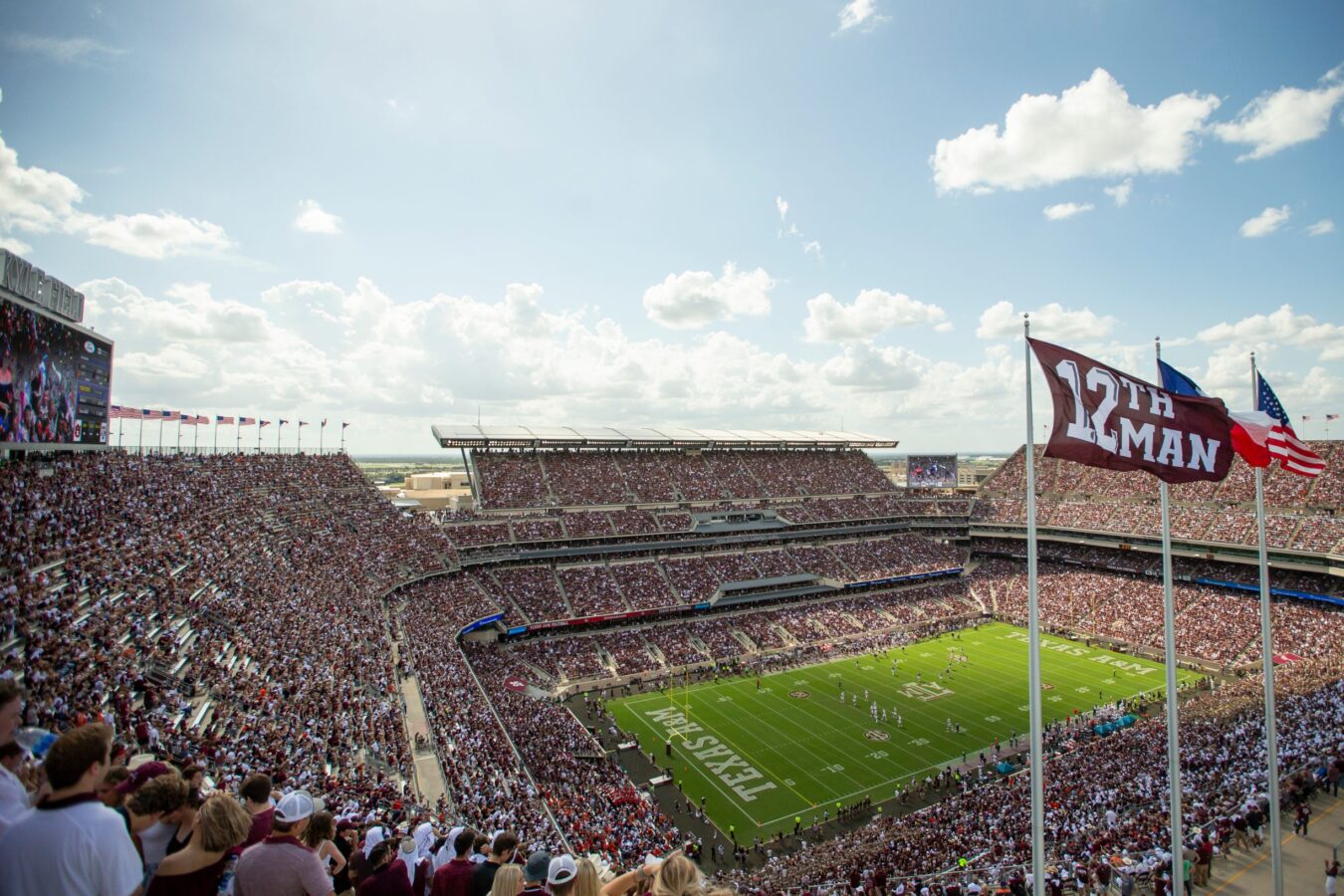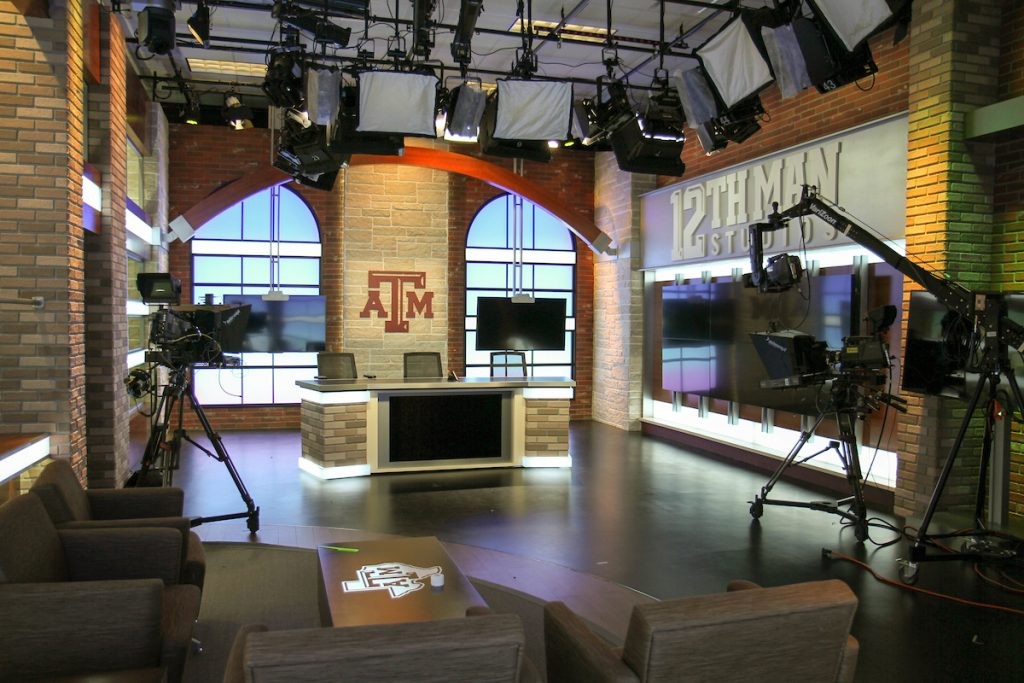12th Man Productions Provides Access to All Texas A&M Fans Thanks to Dante and Dante Domain Manager

Located in the heart of
the Houston-Dallas-Austin triangle, within a two-hour drive of most of the state’s 28 million residents, Texas A&M’s main campus in College Station is home to more than 62,500 students. Another 5,700 are at branch campuses in locations across Texas – and as far away as Qatar.
With
133 undergraduate degree programs, 175 master’s degree programs, 92 doctoral degree programs and five “first-professional” degrees as options for study, Texas A&M and its “Aggies” — the university’s students, graduates, staff and sports teams — are a driving force for research and education within the Lone Star state.
And just as impressive as the university’s academic accomplishments is the school’s long tradition of developing and supporting championship-level athletics. With Texas A&M Aggies football at the heart of the program, the university supports a full athletic lineup that includes football, men’s and women’s basketball, baseball, softball, soccer, volleyball, track and field, golf, tennis, swimming and diving, equestrian events and more.

12th Man Productions
Texas A&M Athletics’
award-winning 12th Man Productions handles the television production needs for Aggies
sports – including content for 12thMan.com, TV shows, videoboard presentations and
ESPN’s SEC Network productions. Along with producing live broadcasts and video features
for all teams, 12th Man Productions also entertains A&M fans with
television shows such as The Pulse, which gives fans an up-close look at Texas
A&M Football in the fall.
The group has taken home multiple awards over the years, including an SVG award
in 2013 for the “Welcome to the SEC” series. 12th Man Productions was
also honored for their part in the successful 2012 Heisman campaign for Johnny
Manziel and was the 2018 winner of the Sports Video Group (SVG) and National
Association of Collegiate Directors of Athletics Administration (NACDA)
Technology Leadership Award.
The 12th Man team, which includes 18
fulltime staff members and up to 90 Texas A&M undergraduate students, moved
into an all-new facility at the south end zone at redeveloped Kyle Field in
2015. The new facility was created with a nearly $12
million investment in the electronics infrastructure to serve Texas
A&M athletics.
The state-of-the-art facility
hosts four HD control rooms, an ESPN bureau cam studio, a main studio set area,
a radio broadcast room, and six post-production edit rooms. 12th Man Productions produces 110
events a year, and the facility’s multiple control
rooms allow the staff to produce side-by-side productions for the SEC
Network from different venues as well as support in-venue shows at the same
time.
In
his role as Chief Broadcast Engineer for Texas A&M, Zack Bacon oversees all
technical support for the 12th Man Productions facility as it relates to
vendors, system upgrades, installations, and system maintenance contracts as
well as provides lead technical support for new and emerging technology needs.
He also provides live event technical support and manages the student
engineering staff.
A Networked, Centralized Approach
With the Kyle Field renovation,
the team began moving toward an IP infrastructure for their audio network. The
team designed a system comprised of manufacturers and technologies, including
JBL and Harman loudspeakers, Soundweb BSS systems, Yamaha CL boards, and RIO 32
Dante stage boxes.
In total, the new infrastructure
has 48 fiber optic runs that tie the Kyle Field control center to the school’s
seven main sports venues. Over the last few years, they have been working to
control all venues from the centralized area.
“When we started the
renovation, we had to choose our audio network platform, and it was obvious
that Dante fit our immediate needs and was also supported by the industry
enough to cover our future plans,” said Bacon. “We definitely have an
extensive Dante deployment, and we’re trying to grow it as much as possible.
It’s a great technology, and we can vouch for its flexibility and how using the
IP infrastructure allows us to do a lot of things we wouldn’t otherwise be able
to do.”
Bacon explained that as a centralized
facility, audio from all facilities is transported to the production control
rooms via Dante, and nearly all audio for broadcast is on a Dante network as
well. The team produces everything essentially through Dante with Yamaha
consoles. The audio signals are mixed, married to the video, and then either
used within the venue or broadcast out. The team also has a direct fiber connection
to ESPN, allowing them to share audio and video content directly.
“We have four control rooms, so we’re able to do two
sports at a time,” said Bacon. “That means two big-screen shows and two
ESPN broadcasts simultaneously, so things can get pretty hectic — and we’re
relying on Dante more and more so we can be as efficient and responsive as
possible.”
Recently, the team upgraded their Studio Tech 214
announcer consoles to be Dante native, instantly improving audio quality and
signal flexibility. Instead of multiple analog/digital conversions with the old
process, now the signal is native Dante straight from the announcer console to
the audio mixer.
The team has also integrated this type of Dante connectivity into their intercom system and are able to directly patch the announcer consoles into the intercom system as well as the audio mixer. Now, when they need to feed audio in and out of the intercom, they can do it straight through the Dante network and into whatever source or destination desired.

Managing the Live Sound
Bacon said each sports venue has its own PA system and the
team is working to bring all venues onto the Dante network, and into Dante Domain
Manager. Currently, the 103,000 seat Kyle Field football stadium and the
production facility are completely Dante networked. The basketball and
volleyball arena is next.
In the case of the football stadium,
the PA system consists of both the main bowl, which is the public area with the
main PA system, as well as entryways, premium spaces, concourses, and
restrooms. The stadium’s back-of-house and front-of-house audio is all the same
network, and it’s all distributed through Dante, and managed with Audio
Architect and Dante Domain Manager.
“There are multiple ways we
could get it into Dante and to the PA mixer, but we run it through our console
and do direct out, then we set up the shared audio group within Domain
Manager,” said Bacon. “Then we just do the patching in the Dante
Controller, and as long as we have the network infrastructure set up,
everything just works.”
The PA systems are distributed audio
DSP networks that are all interconnected by Dante because of the large
distances covered. The Dante network delivers the signal to a network of Harman
London BLU DSPs, and from there to the individual amplifiers.
“With Dante Domain Manager in the football stadium, we’ve
already seen the benefits integrating the PA and being able to send multiple
sources to the PA mixing console, as opposed to previously, we would only be
able to send two,” said Bacon. “We’re currently working with and
sending about six audio signals, but we can obviously send a lot more. This has
been a very convenient and efficient way for us to improve our workflow to make
sure we’re getting audio to the PA and the football stadium so that the show
can go smoothly, and everybody can hear it cleanly.”
Secured
Efficiency
Dante Domain Manager is network management
software that enables user authentication, role-based security, and audit
capabilities for Dante networks while allowing seamless expansion of Dante
systems over any network infrastructure. Dante Domain Manager organizes a network into zones
called “domains” that each have individual access requirements,
making it clear and easy to know who can access any area of the system. All
activity is logged, tagged, and date-stamped so problems can be quickly identified
and solved.
With Dante Domain Manager, Bacon and
the 12th Man Productions team is able to route their audio signals across
subnets to cover the multiple venues and the production areas. Donte Domain
Manager enables the team to create management groups and to segment areas,
venues, subnets, and production rooms as needed. The team is now able to create
some very granular control and security parameters across the network.
“Our student workers do many
functions for us, everything from operating cameras to post-production, and we
have about 20 student engineers as well who are out in the field making sure
everything is working and are actually connecting everything and mixing the
shows,” said Bacon. “Our student engineers are trained on Dante
Domain Manager, and they now do the routing and patching for the various
productions, and we don’t want operators mistakenly going into Dante Controller
and re-routing anything that might impact other simultaneous events.”
Dante
Domain Manager coordinates multiple subnets, allowing Dante audio to be used
across networks of nearly any complexity or size. Dante Domain Manager enables
audio to be plugged into any Ethernet jack, anywhere on campus, and route the
audio data to where it needs to go. Users of Dante-enabled devices do not have
to perform any special configuration; Dante Domain Manager completely automates
this task.
“Dante Domain Manager gives us
detailed audio network control and excellent protection,” added Bacon.
“I can set up user accounts for students, which allows them to only have
access to the things they need. This has taken some of the load off of me and
the other full-time engineer, and it allows us to delegate functions without
worry — it’s been hugely beneficial for us.”



